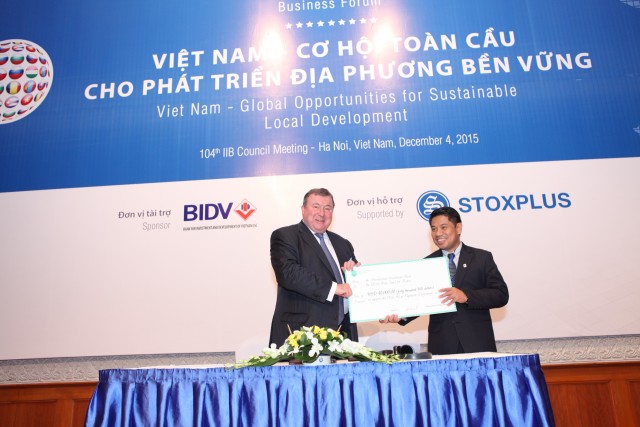IIB is supporting the WWF to help protect Vietnam’s last remaining wild elephant population

The International Investment Bank continued its efforts to contribute to the preservation and protection of its member states’ environment and endangered species. On December 4, 2015, in Hanoi, Vietnam, at the Open Session of the IIB Council that took place during the events of the 104th Council Meeting held on December 3-4, Nikolay Kosov, Chairman of the Bank, thus handed a cheque of USD 40 000 to Dr. Van Ngoc Thinh, Country Director of WWF-Vietnam, the leading Global Conservation Organisation in the country.
As stated by Mr. Kosov, “IIB’s aim is to operate as a socially and environmentally responsible institution, not only not harming the world around us and the other species, but actively engaging with other organisations in their preservation and protection. I am pleased to say that in this sense we have made yet another step forward – we could not have chosen a more reputable and reliable partner than the WWF, a world-renowned organisation.”
The colour of IIB’s logo, adopted by the renewed Bank in 2014, was chosen predominantly with the aim of operating as a “green” development bank.
As Dr. Van Ngoc Thinh commented, despite government efforts on preservation of wild elephants and their cultural and religious significance, over the recent years the wild population has fallen from 1000 to 100. IIB’s funding will enable the WWF to assist in developing provincial and national strategies for protecting the elephants.
In June 2015, the IB also granted a sum of MNT 60 million (around EUR 28 000) to programmes aimed at supporting the threatened populations of the Przewalski’s horse and the Altai snowcock in Mongolia, another IIB member state.
Reference
World Wide Fund for nature (WWF) is one of the largest non-governmental nature conservation organizations in the world, uniting around 5 million constant participants and operating in more than 100 countries. It was established in 1961.The WWF mission is to prevent the increasing degradation of the planet’s natural environment and to achieve harmony between man and nature. The main goal is preservation of the biological diversity of the Earth.
